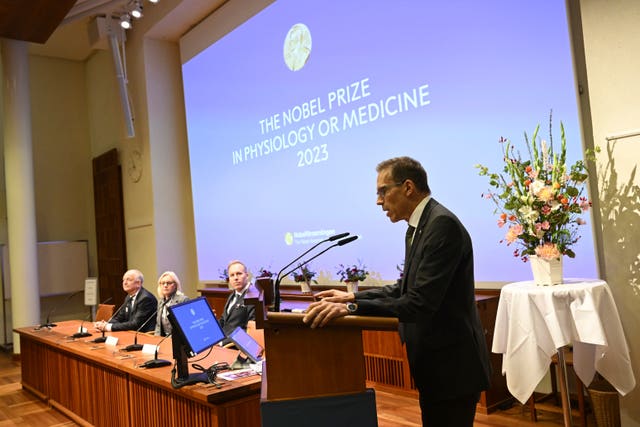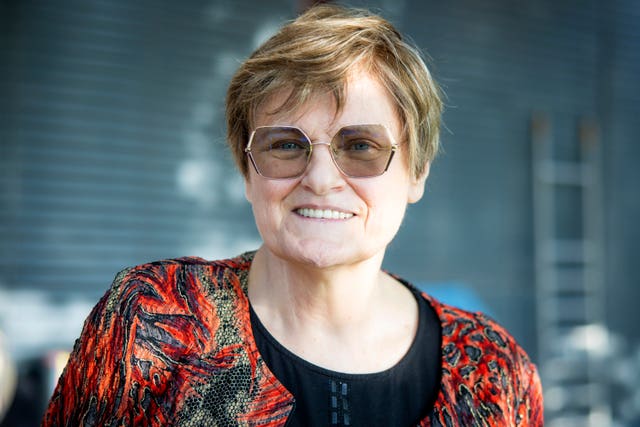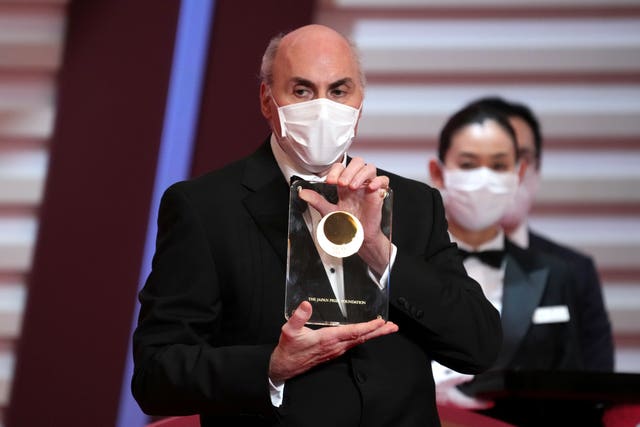The Nobel Prize in medicine has been awarded to Katalin Kariko and Drew Weissman for discoveries that enabled the development of effective mRNA vaccines against Covid-19.
Thomas Perlmann, secretary of the Nobel Assembly, announced the award on Monday in Stockholm.
Ms Kariko is a professor at Sagan’s University in Hungary and an adjunct professor at the University of Pennsylvania. Mr Eisner performed his prize-winning research with Kariko at the University of Pennsylvania.
“Through their groundbreaking findings, which have fundamentally changed our understanding of how mRNA interacts with our immune system, the laureates contributed to the unprecedented rate of vaccine development during one of the greatest threats to human health in modern times,” the panel that awarded the prize said.
Ms Kariko said her husband was the first to pick up the early morning call, then handed it to her to hear the news. “I couldn’t believe it,” she said. “I was very much surprised. But I am very happy.”

Before Covid-19, mRNA vaccines were already being tested for other diseases like Zika, influenza and rabies – but the pandemic brought more attention to this approach, Ms Kariko said.
“There was already clinical trials before Covid, but people were not aware,” she said.
Mr Perlmann said both scientists were “overwhelmed” by news of the prize when he contacted them shortly before the announcement.
Traditionally, making vaccines required growing viruses or pieces of viruses – often in giant vats of cells or, like most flu shots, in chicken eggs – and then purifying them before next steps in brewing shots.
The messenger RNA approach is radically different. It starts with a snippet of genetic code that carries instructions for making proteins. Pick the right virus protein to target, and the body turns into a mini vaccine factory.

Dr Paul Hunter, a professor of medicine at the University of East Anglia, described the mRNA vaccines as a “game changer” in helping to shut down the coronavirus pandemic, crediting the shots with saving millions of lives.
“If it hadn’t been for the mRNA technology, Covid would have been much worse,” he said. “Vaccines generally were the turning point in slowing down Covid and the mRNA vaccines were just so much better than all the others,” he said, noting that the main vaccine used in the UK, made by AstraZeneca, is barely in use anymore.
“We would likely only now be coming out of the depths of Covid without the mRNA vaccines,” Mr Hunter said.
Dr Bharat Pankhania, an infectious diseases expert at Exeter University, said that a major advantage of mRNA technology was that vaccines could be made in extremely large quantities since their main components are made in laboratories.
Dr Pankhania predicted that the technology used in the vaccines could be used to refine vaccines for other diseases like Ebola, malaria and dengue, and might also be used to create shots that immunise people against certain types of cancer or auto-immune diseases like lupus.
“It’s possible that we could vaccinate people against abnormal cancer proteins and have the immune system attack it after being given a targeted mRNA shot,” he explained. “It’s a much more targeted technology than has been previously available and could revolutionise how we handle not only outbreaks, but non-communicable diseases.”

The Nobel Prize in physiology or medicine was won last year by Swedish scientist Svante Paabo for discoveries in human evolution that unlocked secrets of Neanderthal DNA which provided key insights into our immune system, including our vulnerability to severe Covid-19.
The award was the second in the family. Mr Paabo’s father, Sune Bergstrom, won the Nobel Prize in medicine in 1982.
Nobel announcements continue with the physics prize on Tuesday, chemistry on Wednesday and literature on Thursday. The Nobel Peace Prize will be announced Friday and the economics award on October 9.
The Nobel Prizes carry a cash award of 11 million Swedish kronor (£820,000). The money comes from a bequest left by the prize’s creator, Swedish inventor Alfred Nobel, who died in 1896.
The prize money was raised by 1 million kronor this year because of the plunging value of the Swedish currency.
The laureates are invited to receive their awards at ceremonies on December 10, the anniversary of Nobel’s death. The prestigious peace prize is handed out in Oslo, according to his wishes, while the other award ceremony is held in Stockholm.
